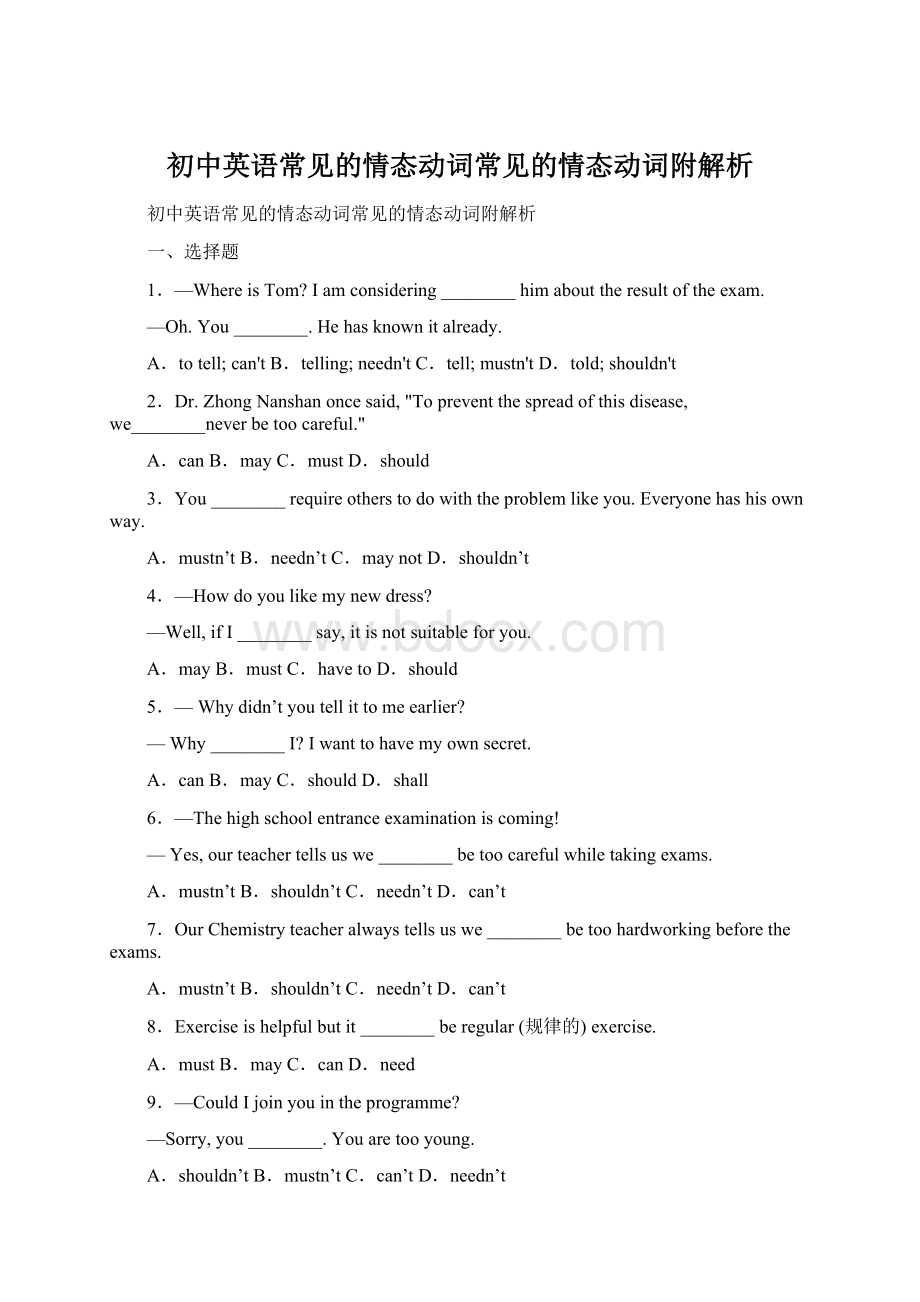初中英语常见的情态动词常见的情态动词附解析Word格式.docx
《初中英语常见的情态动词常见的情态动词附解析Word格式.docx》由会员分享,可在线阅读,更多相关《初中英语常见的情态动词常见的情态动词附解析Word格式.docx(14页珍藏版)》请在冰豆网上搜索。

9.—CouldIjoinyouintheprogramme?
—Sorry,you________.Youaretooyoung.
A.shouldn’tB.mustn’tC.can’tD.needn’t
10.You'
dbetter__________hardfromnowon,__________youwillfailtheexam.
A.work;
andB.working;
orC.working;
andD.work;
or
11.It’sofgreatimportancetoprotecttheenvironment.Eachofus________takeanactivepartinit.
A.canB.mayC.wouldD.should
12.I________hearyouclearly.Wouldyoupleaserepeatit?
A.mustn’tB.can’tC.needn’tD.shouldn’t
13.—Mom,mustIcleanmyroomnow?
—No,you________.Youcandoitafterdinner.
A.needn’tB.mustn’tC.shouldn’tD.can’t
14.IfyoubuyyourmumaniRobotfloorcleaner,she________sweeptheflooreveryday.
A.can’tB.mustn’tC.needn’tD.shouldn’t
15.—Zoe,whatdoyouthinkisthegreatestadvantageofshoppingonline?
—AtleastI______spendmuchtimegoingfromshoptoshop.
A.shouldn’tB.can’tC.needn’tD.mustn’t
16.Pleasedon'
tmakesomuchnoise.I________hearthespeakerverywell.
A.needn'
tB.can'
tC.shouldn'
tD.mustn'
17.Theboyisverybrave.I________he________thetalltree.
A.daresay;
darestoclimb
B.daretosay;
dareclimbing
C.daresaying;
daresclimb
D.daretosay;
daresclimbed
18.—Shallwegocampingthissummerholiday?
—Nothing________bebetter.
A.shouldB.couldC.mustD.may
19.—Wouldyouplease________inthatway?
That’snotsafe!
—Sorry.Iwon’tdoitanymore.
A.notdrivingB.nottodriveC.nodrivingD.notdrive
20.You________writethereportagainbecausespellingmistakesarenotallowedatall.
A.mustB.canC.mayD.could
21.You’vegotanAinthemathstestagain.You________begoodatit.
22.We'
vediscussedeverydetailofthisplanandhavegoteverythingready.Butstillsomething________gowrong.Westillhavetobeverycareful.
A.mustB.shouldC.wouldD.may
23.—Suzydescribedeverydetailoftheaccidentjustnow.
—Hermemory________becompletelyback.
A.shallB.needC.mustD.could
24.—IsthatMrZhou?
—It________behim.HehasgonetoBeijing.
A.canB.mayC.can’tD.shouldn’t
25.Neverthrowobjectsfromthebuilding.Evenasmallobject________causeseriousinjuries,ordeath,whendroppedfromagreatheight.
A.mustB.shouldC.mayD.need
26.—Mum,whydoIhavetowashhandssomanytimesaday?
—You________betoocareful,foryourhealth.
A.can’tB.mustn’tC.maynotD.needn’t
27.—WillJimcometoYangzhouforaholiday?
—He________comeanditdependsonhowmuchhomeworkhewillhave.
A.mayB.shouldC.mustD.need
28.—InChina,manyparentscomplainthattheirchildrenhavetostayuplatetodothehomework.
—Don’tworry.Thegovernmenthasrealizedtheproblem.I’msurethere________begoodnewssoon.
A.canB.shouldC.needD.must
29.Hurryup,orwe________missthebeginningofthefilm.
A.shouldB.mustC.mayD.haveto
30.Sometimessmiles________befalse,hidingotherfeelingslikeanger,fearorworry.
A.shouldB.wouldC.mustD.can
31.Ahard-workingman________becomeagreatscientist,butagreatscientist________beahard-workingman.
A.can’t;
canB.maynot;
mustC.can’t;
mustD.maynot;
can
32.Mr.Black________beathomenow.HewentabroadonvacationlastFriday.
33.—Couldyoutellmehowtorenewthelibrarybooks?
—Withpleasure.You________cometoourdeskeverytime.It’seasiertorenewthemonline.
34.—Thearticlesaysthataperson’sanimalsigndecideshispersonality.
—You________readitforfun,butdon’tbelieveinthat.
A.canB.mustC.shouldn’tD.needn’t
35.—Howbeautifulthewinterjasmines(迎春花)are!
—Yes.Thesegolden-yellowflowers________bewidelyseeninmycityinMarch.
A.mustB.canC.wouldD.should
36.—Mum,Iboughtsomestrawberriesonmywayhome.
—Oh,you’resosweet.Butthestrawberries________beputintothefridgeforfreshness.
A.mustB.canC.mayD.need
37.—InChina,manystudentshavetostayuplatetodotheirhomework.
—Noworries.Thegovernmenthasrealizedtheproblem.I’msurethere________begoodnewssoon.
A.canB.shouldC.mustD.need
38.—Who’sthemanoverthere?
IsthatMr.Black?
—It________behim.Mr.Blackismuchtallerthanthatman.
A.mayB.mustC.can’tD.mustn’t
39.Weteenagers________havedreams.Withdreamsandhardwork,anythingamazing________becreated.
A.may;
canB.might;
shouldC.should;
canD.must;
hasto
40.You________paytoomuchattentiontoprotectingyourselfifyouplantogoabroad.
A.mustn’tB.can’tC.shouldn’tD.needn’t
【参考答案】
1.B
解析:
B
【详解】
句意:
——汤姆在哪里?
我正在考虑告诉他考试的结果。
——哦。
你不必。
他已经知道这件事了。
考查非谓语动词和情态动词。
can'
t不可能;
needn'
t不必;
mustn'
t禁止;
shouldn'
t不应该。
considerdoingsth.考虑做某事,第一空用telling;
再由“Hehasknownitalready.”可知他已经知道考试结果,不必再告诉他,第二空用needn'
t。
故选B。
2.A
A
钟南山院士曾经说过:
“要预防这一疾病的传播,我们多么小心也不为过。
”
考查情态动词。
can能、能够;
may可以;
must必须;
should应该。
can的否定式和too或enough连用表示“多么……也不为过”,其他情态动词没有这种用法,故答案选A。
3.D
D
你不应该要求别人像你一样来处理问题。
每个人都有自己的方法。
mustn’t不许,表禁止;
needn’t不必;
maynot也许不;
shouldn’t不应该;
根据“Everyonehashisownway”每个人都有自己的方法;
可知,此处指“不应该如此要求别人”。
故选D。
4.C
C
——你觉得我的新裙子怎么样?
——好吧,如果我不得不说的话,它不适合你。
must必须(有义务、有必要);
haveto不得不(客观情况驱使);
根据“ifI…say,itisnotsuitableforyou.”可知,此处表示客观情况驱使,因此用haveto“不得不”。
故选C。
5.C
——你为什么不早点告诉我?
——我为什么应该告诉你?
我想要保守我自己的秘密。
can能够;
should应该;
shall将,会。
根据“Whydidn’tyoutellittomeearlier?
”及“Iwanttohavemyownsecret.”可知,此处应该是“我为什么应该告诉你?
”故选C。
6.D
——高中入学考试快到了!
——是的,我们老师告诉我们考试时再怎么仔细都不为过。
mustn’t禁止;
needn’t不必;
can’t不能。
“can’tbetoo+adj.”意为“再怎么样也不为过”,结合语境,故选D。
7.D
我们的化学老师总是告诉我们考试前怎样用功都不为过。
考查情态动词辨析。
mustn’t不能,表禁止;
shouldn’t不应该,表建议;
needn’t不必,指没有必要;
can’t不能,表没有能力或不许可。
根据题干“we…betoohardworkingbeforetheexams”,可知是“can’tbetoo+形容词”结构,表示“再……也不为过”。
8.A
锻炼是有帮助的但是它必须是有规律的锻炼。
must一定,必须;
may也许;
need需要。
根据but转折可知有规律的锻炼才对身体有帮助,故用must表示一定,必须。
故选A。
9.C
——我可以加入你的计划吗?
——对不起,你不能。
你太年轻了。
can’t不能;
needn’t没必要;
根据“Youaretooyoung.”可知,你太年轻了,由此说明你不能参加对方的计划。
10.D
你最好从现在开始努力学习,否则你考试会不及格的。
考查情态动词和连词辨析。
hadbetterdosth最好做某事,排除BC。
and和;
or否则。
分析“…youwillfailtheexam”可知,如果不努力就会不及格,or“否则”符合语境,故选D。
11.D
保护环境是非常重要的。
我们每个人都应该积极参与其中。
can能;
would就会;
根据“It’sofgreatimportancetoprotecttheenvironment”保护环境非常重要;
可知此处指“大家都应该积极参与”,表责任、义务;
12.B
我听不清你说什么。
你能重复一下吗?
needn’t不需要;
shouldn’t不应该。
根据“Wouldyoupleaserepeatit?
”可知,我不能听清,所以需要对方重复,故选B。
13.A
——妈妈,我现在必须打扫房间吗?
——不,不需要。
你可以在晚饭后做。
根据英语语法,对于must开头一般疑问句,若要作否定回答,可用needn’t,不用mustn’t。
14.C
如果你给你妈妈买一台扫地机器人,她就不必每天扫地了。
根据“IfyoubuyyourmumaniRobotfloorcleaner”可知,买了扫地机器人,就不需要人工每天扫地了,故选C。
15.C
——佐伊,你认为网上购物最大的优势是什么?
——至少我不需要花很多时间逛商店。
t不应该;
t不能;
t不需要;
t一定不要,禁止。
根据句意可知,网上购物的最大优点是不需要花很多时间逛店。
“needn'
t”表示“不需要”,故选C。
16.B
请不要发出那么多噪音。
我不能很好地听清楚发言者的话。
needn’t不必,指没必要;
can’t不能,指不能够;
mustn’t不能,表禁止。
根据上文“Pleasedon'
tmakesomuchnoise”可知,别人发出了太多噪音,所以他“不能够”听见演讲者的话,需用情态动词can’t。
17.A
【解析】
句意“这个小男孩非常的勇敢,我敢说,他敢爬上那棵高的树”。
dare既可作情态动词,也可作实意动词。
做情态动词时,无人称与数的变化,且空后用动词原形;
做实意动词时,有人称和数的变化,用daretodosth。
第一空排除C。
第二空即可写成dareclimb也可写成darestoclimb,故选A。
18.B
——今天暑假我们去露营好吗?
——没有比这更好的了。
could可以;
may可能。
根据Shallwegocampingthissummerholiday,可知,此空要对上文的建议表达自己的看法。
否定词+比较级表示最高级的意思,此句表示“没有比这更好的了”,用could表示一种委婉的说法。
19.D
——请不要以那样的方式开车可以么?
那不安全。
——对不起,我不会再那样做了。
考查动词。
driving开车,动名词/现在分词形式;
todrive动词不定式;
drive动词原形。
情态动词would后面用动词原形,否定词not放在drive前面。
20.A
你必须重新写报告,因为根本不允许有拼写错误。
could能够。
根据“spellingmistakesarenotallowedatall”可知,拼写错误是不被允许的,所以报告必须重写。
21.C
你数学考试再次得了A。
你肯定很擅长数学。
can表示推测,可能,一般用于否定句和疑问句中;
may表示推测,可能,发生的可能性较小;
must表示推测,肯定。
should表示推测,应该。
根据“You’vegotanAinthemathstestagain.”及结合语境可知,你肯定擅长数学。
22.D
我们已经讨论过这个计划的每个细节并且把一切都准备好了。
但仍然有可能出错。
我们仍然要非常细心。
would将;
根据此处表示推测,应该用may表示可能性,故选D。
23.C
——苏西刚才描述了事故的每一个细节。
——她的记忆一定完全恢复了。
shall将要;
need需要;
must必须,一定;
could能。
根据“Suzydescribedeverydetailoftheaccidentjustnow.”可知,此处表示非常肯定的推测,故选C。
24.C
——那是周先生吗?
——肯定不是他。
他去了北京。
can能,能够;
may可能;
can’t不可能,表示推测;
根据“HehasgonetoBeijing.”可知,那个人不可能是周先生,故选C。
25.C
切勿将物体从建筑物中扔出去。
从高处坠落时,即使是小物体也可能造成严重伤害或死亡。
根据“Evenasmallobject...causeseriousinjur